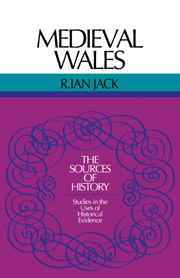Book contents
- Frontmatter
- Contents
- Abbreviations
- General Editor's Introduction
- Preface
- 1 Literary Sources
- 2 The Official Records of Wales and Their Preservation
- 3 The Records of the English Government
- 4 Archives of Individuals and Corporations
- 5 Ecclesiastical Records
- 6 The Antiquaries
- 7 Archaeology and Numismatics
- 8 Cartography and Place-Names
- 9 Conclusion
- Index
3 - The Records of the English Government
Published online by Cambridge University Press: 07 October 2011
- Frontmatter
- Contents
- Abbreviations
- General Editor's Introduction
- Preface
- 1 Literary Sources
- 2 The Official Records of Wales and Their Preservation
- 3 The Records of the English Government
- 4 Archives of Individuals and Corporations
- 5 Ecclesiastical Records
- 6 The Antiquaries
- 7 Archaeology and Numismatics
- 8 Cartography and Place-Names
- 9 Conclusion
- Index
Summary
The official records produced by the activities of the English government are essential sources for medieval Wales. They contain evidence of all manner of English actions which affected Wales, Welshmen, the marches and the lords of the march: the affairs of Wales and England are reflected in a wide variety of record. Moreover, the English government, particularly after the Edwardian Conquest, had occasion to keep office copies of many documents produced by the administrators of Wales. This might be done in the Exchequer in the course of normal business, particularly auditing, or in the Chancery or the law courts in response to questions, writs certiorari, sent from Westminster. As the previous chapter made plain, these English copies are not infrequently the only surviving texts. As well as making copies, the English departments, in particular the Exchequer and the law courts, acquired in their normal routine many Welsh documents, often documents from private estates. The Court of Augmentations, created to meet the dissolution of the monasteries, was the most spectacular of the courts which acquired Welsh records, but other law courts, particularly equity and prerogative courts, heard many cases touching Wales and retained not only the record of the suit but also curious items which were originally exhibits.
In another book in this series, Professor Elton has given an admirable introduction to the English official records. What he says there does not need to be repeated here, but some indication of the series in which information relevant to Wales can be found is appropriate.
- Type
- Chapter
- Information
- Medieval Wales , pp. 79 - 100Publisher: Cambridge University PressPrint publication year: 1976

